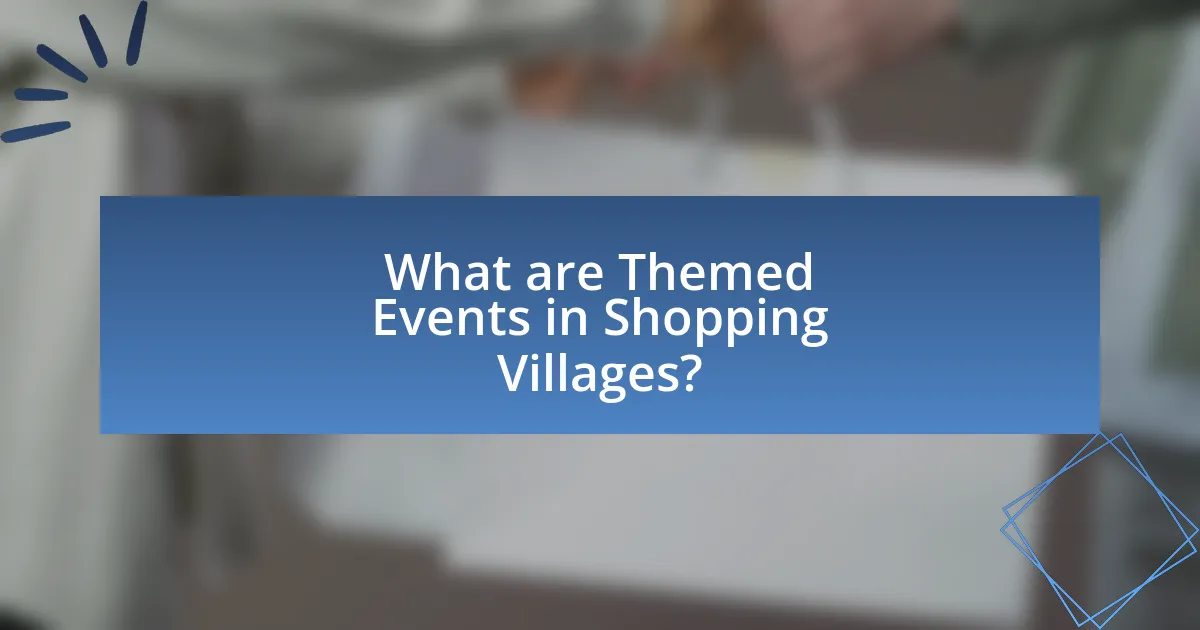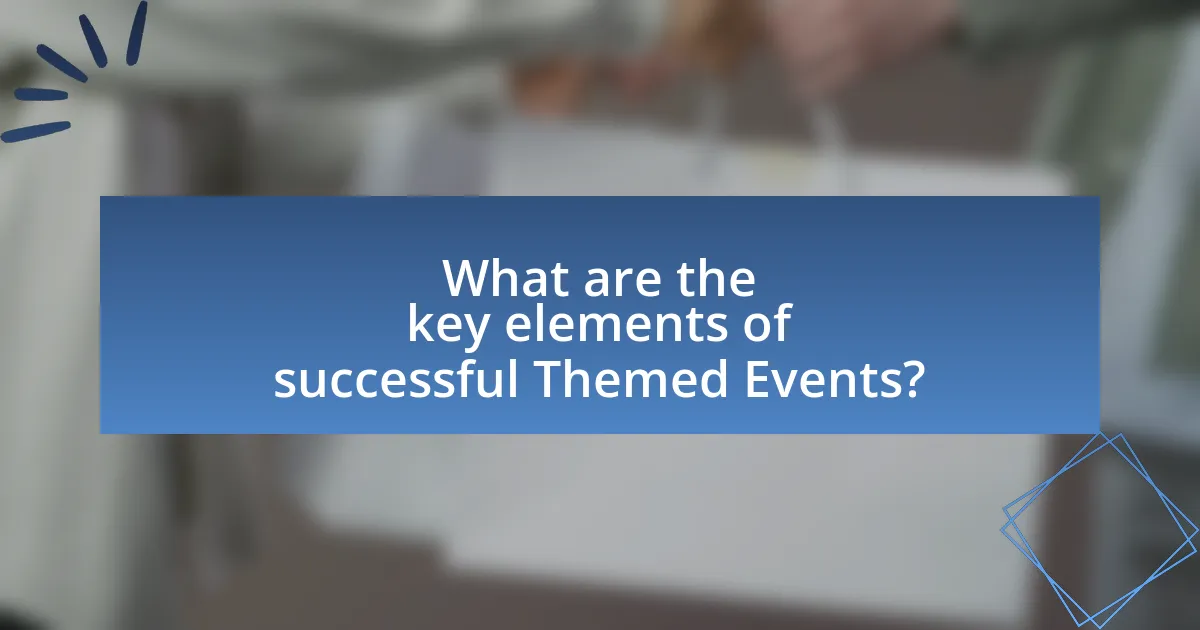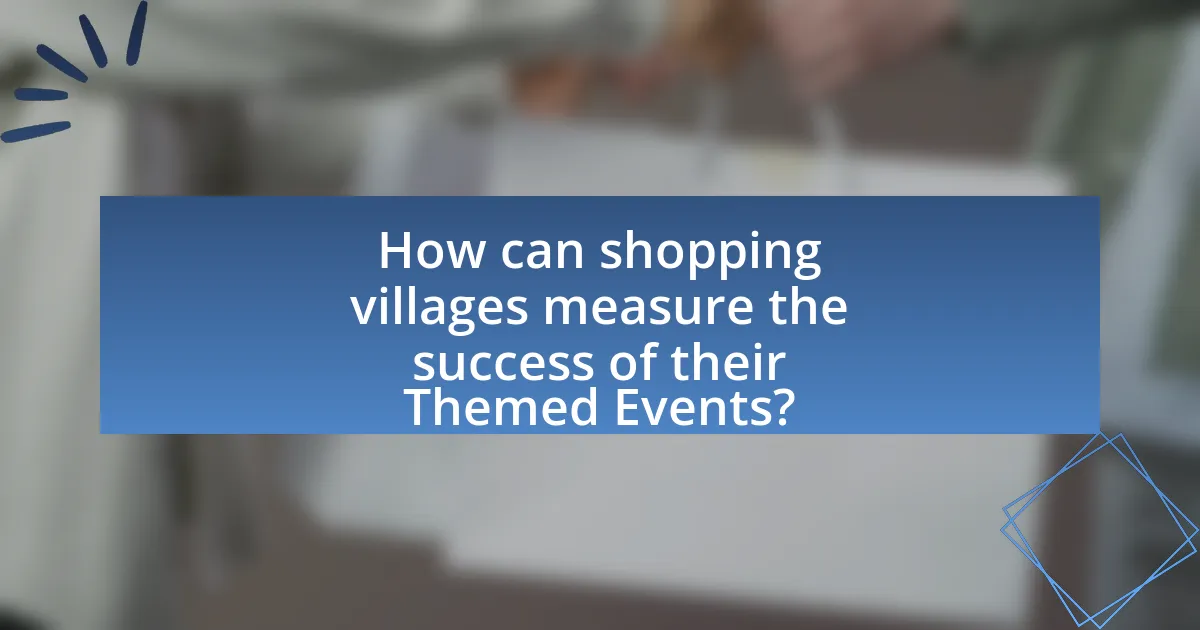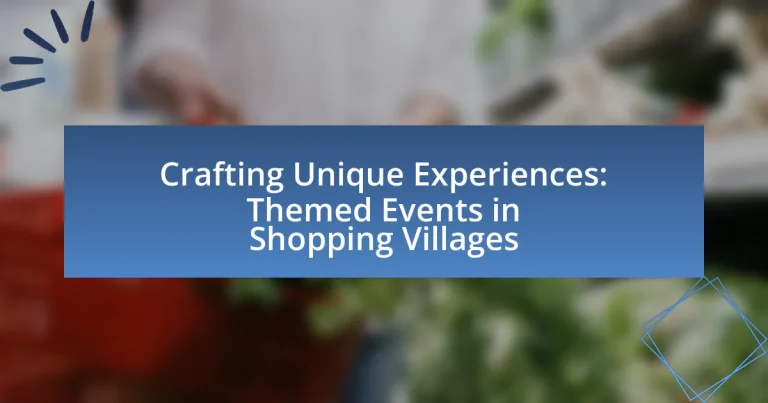The main entity of the article is themed events in shopping villages, which are organized activities centered around specific themes aimed at enhancing the shopping experience and attracting visitors. The article outlines how these events, such as seasonal festivities and cultural celebrations, create immersive environments that engage customers emotionally and socially, leading to increased foot traffic and sales. It discusses the importance of effective planning, marketing strategies, and community involvement in organizing successful themed events, as well as the metrics used to measure their success. Additionally, the article highlights the role of partnerships with local businesses and artists in enriching the event experience and fostering community engagement.

What are Themed Events in Shopping Villages?
Themed events in shopping villages are organized activities or celebrations that revolve around a specific theme, designed to enhance the shopping experience and attract visitors. These events often include seasonal festivities, cultural celebrations, or promotional activities that engage customers through entertainment, food, and unique shopping opportunities. For example, a shopping village may host a winter holiday market featuring local artisans, festive decorations, and live music, which not only boosts foot traffic but also fosters a sense of community and enhances the overall shopping atmosphere.
How do Themed Events enhance the shopping experience?
Themed events enhance the shopping experience by creating immersive environments that engage customers emotionally and socially. These events attract larger crowds, as they often feature unique activities, entertainment, and promotions that encourage shoppers to spend more time and money. For instance, a study by the International Council of Shopping Centers found that 70% of consumers are more likely to visit a shopping center that hosts themed events, demonstrating their effectiveness in driving foot traffic and sales. Additionally, themed events foster a sense of community and belonging, making shopping not just a transactional activity but a memorable experience that encourages repeat visits.
What types of themes are commonly used in shopping villages?
Shopping villages commonly utilize themes such as seasonal celebrations, cultural festivals, and lifestyle experiences. Seasonal celebrations often include holiday-themed events like Christmas markets or summer fairs, which attract visitors with festive decorations and activities. Cultural festivals may showcase local traditions, food, and crafts, enhancing community engagement and tourism. Lifestyle experiences focus on wellness, fashion, or culinary arts, providing interactive workshops and demonstrations that resonate with consumer interests. These themes are effective in creating unique shopping experiences that draw in diverse audiences and encourage repeat visits.
How do these themes attract different customer demographics?
Themed events in shopping villages attract different customer demographics by creating tailored experiences that resonate with specific interests and lifestyles. For instance, a family-friendly theme may include activities like face painting and puppet shows, appealing to parents with young children, while a luxury-themed event featuring high-end brands and exclusive offers attracts affluent shoppers. Research indicates that 70% of consumers are more likely to engage with brands that offer personalized experiences, highlighting the effectiveness of themes in drawing diverse groups. Additionally, seasonal themes, such as holiday markets, can attract a wide range of demographics, from families seeking festive activities to young adults looking for unique shopping experiences.
Why are Themed Events important for shopping villages?
Themed events are important for shopping villages because they enhance customer engagement and drive foot traffic. By creating unique experiences, shopping villages can attract diverse audiences, leading to increased sales and brand loyalty. For instance, themed events such as seasonal festivals or cultural celebrations can draw in visitors who may not otherwise visit, resulting in a measurable increase in customer numbers. Research indicates that experiential marketing, which includes themed events, can boost sales by up to 20% during the event period, demonstrating their effectiveness in promoting shopping villages.
What impact do they have on foot traffic and sales?
Themed events in shopping villages significantly increase foot traffic and sales. These events attract a diverse audience, creating a lively atmosphere that encourages visitors to explore the shops and engage in activities. For instance, a study by the International Council of Shopping Centers found that shopping centers hosting themed events experienced a 20% increase in foot traffic and a corresponding rise in sales during the event period. This correlation demonstrates that unique experiences not only draw customers but also enhance their spending behavior, ultimately benefiting the retailers within the shopping village.
How do they contribute to brand loyalty and community engagement?
Themed events in shopping villages contribute to brand loyalty and community engagement by creating memorable experiences that foster emotional connections with consumers. These events encourage repeat visits and enhance customer relationships, as participants often associate positive feelings with the brand hosting the event. For instance, a study by Eventbrite found that 78% of consumers prefer to engage with brands through experiences rather than traditional advertising, highlighting the effectiveness of experiential marketing in building loyalty. Additionally, themed events often promote community involvement, as local vendors and artists are showcased, strengthening ties within the community and encouraging collaborative engagement.

What are the key elements of successful Themed Events?
The key elements of successful themed events include a clear theme, engaging activities, effective marketing, and attention to detail. A clear theme provides a cohesive experience that resonates with attendees, while engaging activities encourage participation and enhance enjoyment. Effective marketing ensures that the target audience is aware of the event, utilizing social media and local advertising to reach potential attendees. Attention to detail, such as decor, costumes, and ambiance, creates an immersive environment that aligns with the theme, enhancing the overall experience. These elements collectively contribute to the success of themed events, as evidenced by case studies showing increased attendance and participant satisfaction in well-executed events.
How does planning play a role in the success of these events?
Planning is crucial for the success of themed events in shopping villages as it ensures that all logistical elements are organized and aligned with the event’s objectives. Effective planning involves setting clear goals, coordinating resources, and scheduling activities, which collectively enhance the overall experience for attendees. For instance, a well-planned event can lead to increased foot traffic, higher sales, and improved customer satisfaction, as evidenced by a study from the Event Marketing Institute, which found that 84% of consumers value experiences over products. This highlights that meticulous planning directly contributes to creating memorable experiences that resonate with visitors, ultimately driving the success of the event.
What are the essential steps in organizing a themed event?
The essential steps in organizing a themed event include defining the theme, setting objectives, creating a budget, selecting a venue, planning logistics, promoting the event, and evaluating its success. Defining the theme establishes the event’s identity and guides all subsequent decisions. Setting objectives clarifies the purpose, whether it’s to attract visitors or enhance community engagement. Creating a budget ensures financial feasibility, while selecting a venue that aligns with the theme enhances the overall experience. Planning logistics involves coordinating details such as catering, entertainment, and decorations. Promoting the event through various channels increases visibility and attendance. Finally, evaluating the event’s success through feedback and metrics informs future improvements. These steps are critical for executing a successful themed event that resonates with attendees.
How can shopping villages effectively market their events?
Shopping villages can effectively market their events by utilizing targeted social media campaigns, local partnerships, and engaging content creation. Social media platforms like Facebook and Instagram allow shopping villages to reach specific demographics, promoting events through visually appealing posts and targeted ads. Collaborating with local businesses and influencers enhances visibility and credibility, as these partnerships can amplify event promotion through shared audiences. Additionally, creating engaging content such as videos, behind-the-scenes looks, and interactive posts can generate excitement and encourage community participation. According to a study by the Content Marketing Institute, 70% of consumers prefer to learn about a company through articles rather than ads, highlighting the importance of content-driven marketing strategies.
What role do partnerships play in Themed Events?
Partnerships play a crucial role in themed events by enhancing resource sharing, increasing audience reach, and providing diverse expertise. Collaborating with local businesses, sponsors, and community organizations allows event organizers to pool resources, such as funding, marketing channels, and logistical support, which can significantly elevate the event’s quality and visibility. For instance, a shopping village may partner with local artisans to showcase their crafts during a themed event, thereby attracting a larger audience interested in unique, locally-made products. This collaboration not only enriches the event experience but also fosters community engagement and supports local economies.
How can local businesses collaborate for mutual benefit?
Local businesses can collaborate for mutual benefit by organizing joint marketing campaigns and themed events that attract customers to their shopping villages. For instance, businesses can create a themed festival that showcases their products and services, encouraging cross-promotion and increasing foot traffic. According to a study by the American Independent Business Alliance, communities that support local business collaborations see a 50% increase in customer engagement and sales. This collaborative approach not only enhances visibility for each business but also fosters a sense of community, leading to sustained customer loyalty and increased revenue for all participating entities.
What are the advantages of involving local artists and entertainers?
Involving local artists and entertainers enhances themed events in shopping villages by fostering community engagement and creating authentic experiences. Local artists bring unique cultural perspectives and talents that resonate with the community, making events more relatable and enjoyable for attendees. Additionally, their participation supports the local economy, as it encourages spending within the community and promotes local talent. Research indicates that events featuring local artists can increase foot traffic by up to 30%, demonstrating their effectiveness in attracting visitors and enhancing the overall atmosphere of shopping villages.

How can shopping villages measure the success of their Themed Events?
Shopping villages can measure the success of their themed events through various metrics such as attendance numbers, customer feedback, and sales data. Attendance numbers provide a direct indication of interest and engagement, while customer feedback, gathered through surveys or social media, offers insights into visitor satisfaction and areas for improvement. Additionally, analyzing sales data during the event period compared to previous periods can reveal the financial impact of the event, demonstrating its effectiveness in driving revenue. For instance, a shopping village that hosted a holiday-themed event may track an increase in foot traffic and sales by 20% compared to the same time frame in the previous year, validating the event’s success.
What metrics should be used to evaluate event performance?
To evaluate event performance, key metrics include attendance numbers, participant engagement levels, revenue generated, and post-event feedback. Attendance numbers provide a clear indication of interest and reach, while participant engagement levels, measured through interactions and activities, reflect the event’s ability to captivate its audience. Revenue generated is crucial for assessing financial success, and post-event feedback, often gathered through surveys, offers insights into attendee satisfaction and areas for improvement. These metrics collectively provide a comprehensive view of an event’s effectiveness and impact.
How can customer feedback be effectively gathered and analyzed?
Customer feedback can be effectively gathered and analyzed through structured surveys, direct interviews, and social media monitoring. Surveys, both online and offline, allow businesses to collect quantitative data on customer satisfaction and preferences, while direct interviews provide qualitative insights into customer experiences. Social media monitoring enables real-time feedback analysis, capturing customer sentiments and trends. According to a study by the Harvard Business Review, companies that actively seek and analyze customer feedback can improve customer retention by 10% to 15%. This demonstrates the importance of utilizing multiple channels for feedback collection and employing data analysis techniques to derive actionable insights.
What role does social media play in measuring event success?
Social media plays a crucial role in measuring event success by providing real-time feedback and engagement metrics. Platforms like Facebook, Instagram, and Twitter allow event organizers to track attendance, audience sentiment, and overall reach through likes, shares, comments, and hashtags. For instance, a study by Eventbrite found that 80% of event organizers use social media to promote their events, and 70% consider social media engagement as a key performance indicator of success. This data illustrates how social media not only amplifies event visibility but also serves as a direct measure of participant engagement and satisfaction.
What are some best practices for future Themed Events?
Best practices for future themed events in shopping villages include thorough audience research, creative theme development, and effective marketing strategies. Conducting audience research ensures that the themes resonate with the target demographic, increasing engagement and attendance. Creative theme development involves incorporating unique elements that align with current trends and customer interests, enhancing the overall experience. Effective marketing strategies, such as leveraging social media and local partnerships, can significantly boost visibility and participation. According to a study by Eventbrite, 78% of event organizers believe that a well-defined theme is crucial for event success, highlighting the importance of these practices.
How can shopping villages innovate their themes to stay relevant?
Shopping villages can innovate their themes to stay relevant by integrating seasonal and cultural events that resonate with their target audience. For instance, hosting local artisan markets or food festivals can attract visitors and create a sense of community. Additionally, incorporating technology, such as augmented reality experiences or interactive installations, can enhance visitor engagement. Research indicates that experiential retail, which focuses on creating memorable experiences, can increase foot traffic by up to 30% (source: “The Future of Retail: Trends and Innovations,” Retail Institute, 2022). By continuously adapting their themes to reflect current trends and consumer interests, shopping villages can maintain relevance and appeal.
What strategies can be implemented to improve customer engagement?
To improve customer engagement in shopping villages, implementing themed events is highly effective. These events create immersive experiences that resonate with customers, fostering emotional connections and encouraging repeat visits. For instance, seasonal festivals or cultural celebrations can attract diverse audiences, enhancing foot traffic and sales. Research indicates that experiential marketing, such as themed events, can increase customer engagement by up to 70%, as it allows customers to interact with brands in memorable ways. Additionally, incorporating interactive elements, such as workshops or live performances, further enhances engagement by providing customers with unique, participatory experiences.
What tips can enhance the planning of Themed Events in Shopping Villages?
To enhance the planning of themed events in shopping villages, it is essential to focus on audience engagement, cohesive branding, and logistical efficiency. Engaging the target audience through interactive activities, such as workshops or live performances, increases participation and enjoyment, which is supported by studies showing that experiential marketing can boost customer loyalty by up to 70%. Cohesive branding ensures that all elements of the event, from decorations to promotional materials, align with the theme, creating a memorable experience that resonates with visitors. Additionally, meticulous logistical planning, including scheduling, vendor coordination, and crowd management, is crucial for smooth execution, as evidenced by successful events that prioritize these aspects, leading to higher attendance and satisfaction rates.


